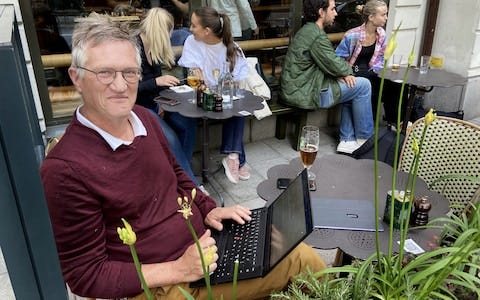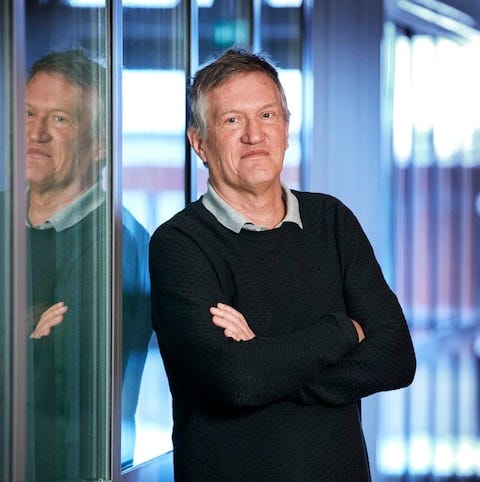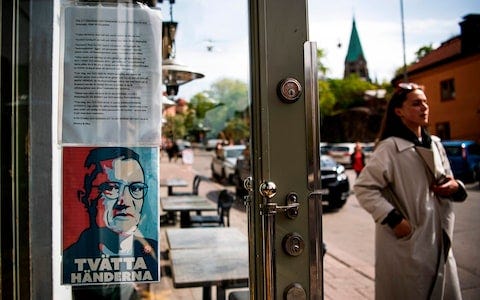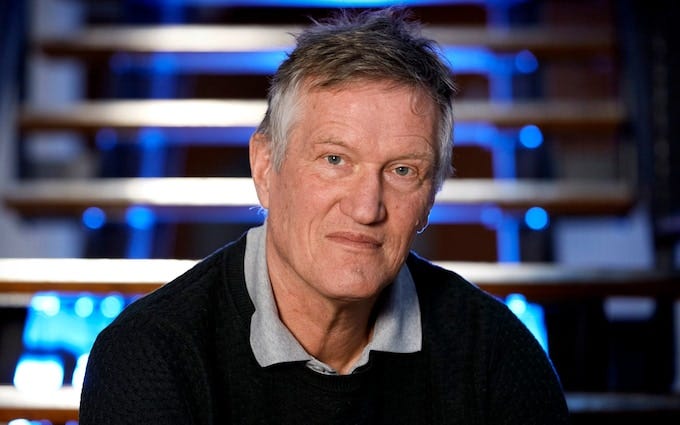Anders Tegnell of Sweden showed stones of steel for he cut against the grain & told Trump administration clown car Task Force idiots, told the whole world to EFF off with their lockdown lunacy
Anders won saying ‘Lockdown was never on the agenda in Sweden’ While the world’s governments pushed crippling Covid restrictions on their people, one nation – and one man, stood apart
‘What Tegnell did in the spring of 2020 will be valued and discussed long after he is gone’
https://www.telegraph.co.uk/news/2023/03/23/anders-tegnell-swedens-pandemic-plan-lockdown-never-agenda/
‘In March 2020, as, one by one, every country in the Western world succumbed to panic and imposed a lockdown on its population, Sweden’s state epidemiologist held his nerve and stuck to the plan. The Swedish people would be given sensible advice and told to work from home wherever possible, but apart from a ban on gatherings of over 50 people and a few rules for restaurants, any Covid measures were entirely voluntary. Anders Tegnell simply didn’t think the evidence supported a lockdown. A veteran of the swine flu pandemic who had worked with the deadly Ebola virus, the 63-year-old doctor wasn’t going to do something unproven or plain stupid because a lot of over-heated people were yelling at him to do it.
This was Sweden’s first piece of good luck. Years earlier, Tegnell had been talent-spotted by Johan Giesecke, who then held the title of state epidemiologist himself. Giesecke singled out the young medic for his character, which he praised as “apolitical – one of those people who did what they were supposed to without reflecting too much on what was expedient or politically viable at the time” (A sort of anti-Matt Hancock). Tegnell possessed the same cool detachment that made his fellow Swede, Björn Borg, a great champion. He even shared the tennis star’s match-winning mantra: “Ice in the stomach.”
Such qualities were to prove invaluable on the lonely and hugely controversial course that Tegnell charted through the Covid-19 pandemic. It was to become known as the “Swedish Experiment”. Reviled internationally, Tegnell was accused of playing Russian roulette with his population. He was a eugenicist who “doesn’t care if people die”. The New York Times actually ran a headline calling Sweden a pariah state. But, as a quietly modest but firmly unrepentant Anders Tegnell told me when we met recently at the university in his home town of Linkoping, it wasn’t Sweden that had opted for a vast experiment called lockdown
“If you go back to the Spanish flu (1918-19), you can find instances when they tried to lock things down,” Tegnell says, “But in all the pandemic plans we have been discussing during the last decades, closing down a society has never even been on the agenda.” Shutting down could be of benefit for a short while, he concedes. “I mean, if you know that your healthcare system needs a few weeks to ramp up the ICU and so on, there are instances when such things can be a solution.”
Normally, though, you wouldn’t go down that route because an airborne respiratory virus was going to sweep through the population anyway. The best you could hope for was to slow it down while protecting the vulnerable. Weighing things up with his team at the Public Health Agency in Stockholm, Tegnell reckoned that the cost of lockdown – to the economy, children, education, general health and wellbeing – would be horrifyingly high. So why does he think the other countries went for it?
Anders (with charming Shwedish sibilance it’s pronounced “Andoosh”) reckons it was the brutal Chinese crackdown in Wuhan that inspired Western governments. “China is, of course, a state where [draconian] things like that can be done,” Tegnell says, “And it did work to a certain extent. So, for a while, there was an idea that we should have very strict measures like a hammer coming down. Bam! Bring the hammer down hard and then take the hammer away and then sort of let it slowly build up again and then, bam! But that never worked.”
Tegnell’s craggy visage – it has been described as a relief map of Chile – cracks a rueful smile. “We learn quite soon that it’s easy to start having different kinds of restrictions, but it’s very difficult to stop having them.”
It sure is, when you know the virus will come roaring back. That was one problem lockdown advocates failed to foresee. To a remarkable extent, frightened people (the British were deliberately and professionally frightened by Government psychologists, remember) fell in love with their corona captivity. And that, in a nutshell, is how every country in Europe ended up suffering from Stockholm Syndrome while, in Stockholm, life went on. Things were quieter, definitely, but there were no billboards with scary pictures of Covid patients, no masks, no street furniture of fear.
Tegnell points proudly to mobile phone records which indicate that Swedes chose to restrict travel and social activities which were criminalised elsewhere. Could it have worked here in the UK without our fundamental freedoms being confiscated by emergency powers? Brits had already started to modify their behaviour before lockdown. If Tegnell was right, and it was fine for family members to see each other, for children to run around in playgrounds, were the British people victims of wrongful imprisonment?

Today, Thursday March 23, seems a good day to ask those big questions. It is exactly three years since the then Prime Minister made a solemn TV announcement telling the British people “You must stay at home”. In contravention of every freedom-loving fibre in his body, Boris Johnson said that we would be banned from leaving our houses unless it was “shopping for essentials” or “one form of exercise a day”.
What exactly was “the science” behind only being allowed outside once a day? (Meanwhile Swedes were being told it was safest to be outdoors, especially for the elderly who wanted to mix. Swedish national parks had never had so many visitors, Tegnell says.) Few dared ask. The scientists who broadly agreed with the Swedish approach, like Professor Sunetra Gupta and Professor Carl Heneghan, were disgracefully either slandered or silenced.
“Three weeks to flatten the curve” turned into months of restrictions, some horribly cruel, others incomprehensibly potty as Boris’s imaginative account this week of Number 10’s breach of the rules reminds us.
Sweden became hugely important to those of us who thought lockdown was bound to do more harm than good. The name Anders Tegnell acquired an almost talismanic power. Like Aslan in the Chronicles of Narnia, Tegnell represented a figure of unique moral resolve, resistant to the tyranny into which our own dear country had tumbled.
So, in some strange way, my visit to Sweden felt more like a pilgrimage than an assignment, carrying with me a clutch of messages from Telegraph readers that I planned to read to him. The one from Lyn was typical: “Please tell Anders he was a beacon of hope for millions of people in the UK who wished our government had followed his sensible, science-based approach.”
By the end of the first week of March 2020, as restrictions deepened across the world, Tegnell’s stoical, light-touch approach came under fire at home from other scientists and senior figures in the media. The political editor-in-chief of Dagens Nyheter, Sweden’s newspaper of record, tweeted that children being told to go back to the classroom after the February break was “incomprehensible”. The pressure mounted when neighbouring Denmark and Norway closed all schools on March 11 and 12 respectively. Still, Tegnell resisted. Over-16s and university students would move to remote learning, he agreed, but younger kids should be in class as normal. That was Tegnell’s red line.
In the early morning of March 13, Johan Giesecke sent his protégé an email containing a single line of Latin. “An necsis, mi fili, quantilla prudentia mundus regatur?” (Don’t you know, my son, with how little wisdom the world is governed?)
The two veteran epidemiologists were privately aghast. “The world has gone mad,” Tegnell told colleagues. They were surprised, he says, by how quickly the politics took over in other countries. “We haven’t really seen that in major health threats for a long, long time. And the fact that the politicians then went as far as they did with so little evidence about what kind of effects they would get... In Sweden, it’s even written into the law that the health care should be driven by evidence-based medicine and that was so quickly left behind in other places.”
This was Sweden’s second stroke of luck, I think. The country’s constitution forbids politicians from making public health decisions and gives all the power to Folkmyndigsheten (the Public Health Agency). Stefan Lofven, Sweden’s prime minister, was kept in the loop along with other ministers, but they played no part in the 2pm daily press briefings. Those were led by Anders Tegnell, who rapidly acquired the status of national hero. That craggy face was printed on T-shirts; the young even sported Tegnell tattoos.

Anders is not a demonstrative man, but he cannot hide his delight when I mention that I heard his wife got a large bouquet to thank her “for lending him to us”. “Yes, and there were lots delivered to my building. Public health agencies don’t so often get flowers,” he smiles. (There were darker times too. Until recently, Tegnell had two bodyguards following threats to his life on social media from conspiracy theorists of all stripes.)
Basically, the strategy was quite simple. Tegnell trusted the people and they rewarded him for treating them like grown-ups by trusting him right back. Huge public confidence in the state epidemiologist only took a dent when the second Covid wave proved to be bigger than he’d hoped. (Even then, when he finally suggested that masks should be worn on public transport, only 15 per cent of travellers bothered).
There continued to be fierce national debate about whether Sweden was being too complacent, but there was no baying for blood like there was from the British media as broadcasters with GCSE biology screeched at hapless UK ministers to hurry up and shut the schools. Sweden’s constitution gave Tegnell the luxury of not fretting over short-term setbacks as politicians must and allowed him to focus on the long game. He knew that was how he would be judged.
Tegnell is not an easy man to read – he has the unrushed impassivity of a taciturn sheriff in a Western – but he is visibly taken aback when I tell him that we had a group in the UK called SPI-B ( (Scientific Pandemic Influenza Group on Behaviour) which said that, in order to increase adherence to social distancing measures, the “perceived level of personal threat needs to be increased”.
“I’m a great believer that most people are reasonably sane and if you give them good information about what they can do and the possible threat that they might experience, they usually make good choices,” he responds. “In Sweden, we try to inform people about what we know and what we don’t know and what kind of things that can be done and that can have some kind of reasonable effect on the risk for you as an individual or a risk for your family.” Not for the first time, I feel a pang of pure envy that Swedes had the sober wisdom of Tegnell while our leaders were drunk on power.

It could all have been so different. Until March 23, 2020, the UK was following the same mitigation (“squash the sombrero”) strategy as Sweden. “Wonderful isn’t it?” Anders Tegnell had replied just a few days earlier when a colleague emailed him a YouTube clip of Boris Johnson and Sir Patrick Vallance explaining that they didn’t want to prevent everyone getting the virus because immunity must be allowed to build up in the population.
All that changed after a report by Professor Neil Ferguson and Imperial College predicted that letting the virus spread freely in the UK without any measure being taken would result in 510,000 deaths. Almost overnight, the previously uncontroversial concept of herd immunity – flokk immunitet in Swedish – and educating the public so they could assess their own risk became a callous idea and anyone who believed in it was a Granny Killer. Britain abandoned mitigation and picked up the hammer. Sweden was all alone.
Was Tegnell disappointed by the British U-turn?
“I’m not going to make any judgments on different countries,” he shrugs, “I think everybody did the best they could in the circumstances. Of course, it’s always nice to have somebody else who thinks and does about the same as you do because then you can share experience and become much better because you see, if this goes slightly wrong over there, you can correct yourself, and the other way around.”
Tegnell is far more critical of the Ferguson report which, he points out, was not even peer-reviewed. “We had worked with modelling quite a lot in our agency and I think we knew very much about both the strengths and the weaknesses. It can be a very nice tool if you use it the right way. But if you model with data that is not of very high reliability, the results can be very, very tricky and you need to be very cautious. If you put numbers into models and you don’t know those numbers are fairly much correct, you can arrive at very, very strange results.”
“You need to weigh together different sources of science and then you can maybe arrive at something that’s reasonably, hopefully true,” Tegnell continues in his measured way, “And you need to really double-check and see if you get more people doing the same thing before you can feel reasonably safe. But to rely very much on just one study, one model, that’s quite dangerous.”

Dangerous? Was Boris hustled into lockdown on the basis of a worst-case scenario that wasn’t double-checked against real-world evidence? It wouldn’t be the first time the UK had committed to a ruinous course of action on the basis of a dodgy dossier.
Of course, Tegnell wasn’t perfect. A failure to act faster to protect care homes is among his biggest regrets. There were systemic problems with nursing care in Sweden even before the pandemic, he explains, but the health experts should have done more to stem the high number of deaths.
Advertisement
What Tegnell got right was never directing hospitals to discontinue non-Covid care (as happened in the NHS) and digging his heels in to protect children who were at remarkably little risk from Covid (“I have never known a virus with a clearer age profile”). With every other European country closing its schools, why was keeping them open so important to him?
“In all the discussions we had, mental health of children was very high because we know that, if they are not able to go to school, mental health will deteriorate. There’s lots of studies and evidence around that. We also knew that one of the major problems with public health in Sweden [before the pandemic] was the mental health among the young. So, we didn’t want to hurt that any more than we already did.”
Were similar heartfelt conversations about protecting the mental health of youngsters taking place in Whitehall? You just know they weren’t. Britain lacked a figure of scientific and moral authority who could take a stand against contagious groupthink.
The Lancet estimated that the bill for closing British schools for 12 weeks was one per cent of GDP because so many parents would need to stay home. But that wasn’t the true bill, not even close. Among the hidden costs were nearly 100,000 “ghost” children who never returned to the classroom and more than a million youngsters now on waiting lists for mental health services.
Karl Lauterbach, Germany’s fervent lockdown chief, recently said that closing schools was “a bad mistake” and some Covid restrictions were “idiotic”. Does Tegnell think we are gradually seeing an admission that lockdown did indeed cause the horrifying collateral damage that he foresaw?
He nods slowly. “Yes, I think we are in a period of review and re-evaluation and schools are such a good example because it's so clear that the benefits were basically none and the damage you could do was so extensive.”
Our then Heath Secretary wasn’t interested in whether Tegnell might be on to something with his determination to keep the public calm and well-informed instead of “frighten the pants off them”, which was the preferred Hancock strategy. “F------ Sweden argument,” Hancock ranted on WhatsApp, asking aides to “supply three or four bullets [points] of why Sweden is wrong”. If Sweden started to do well it would simply be unwanted evidence that Hancock and lockdown had been wrong.
Intriguingly, the PM and Rishi Sunak had held a secret Zoom meeting with Tegnell and Professors Gupta and Heneghan in September 2020 to hear their take on a potential “circuit-breaker lockdown”. Tegnell says he was “a bit surprised” to be asked. His impression was that Boris and Rishi were “quite open” to hearing it was a bad idea. Hancock was furious when he found out the lockdown sceptics had the ear of the PM.
Tegnell’s approach in Sweden paid off. After a shaky start (in May 2020, the country had the highest Covid-19 death rate in the world), Sweden did start to do well. Very well. Embarrassingly well. Critics who had crowed about Sweden’s early high Covid mortality fell silent. As I write, Sweden has the lowest rate of excess deaths of any European country (that’s how many more people die every month compared to normal). It may not be the very lowest once you standardise for age and pre-pandemic trends, but it’s still an astonishing achievement. Who knew that not shutting down life would, in the long run, avoid more death?
Anders Tegnell, that’s who. Is he happy that it looks increasingly like the verdict of history will be that Sweden defied the Western lockdown consensus and was vindicated?
“I don’t really like to be called vindicated,” he says sternly, “Because this is not a competition. This is about public health. It’s about trying to do your best to keep your population as healthy as they possibly can be during a health crisis.” Besides, the excess death data can be tricky and needs more scrutiny, he thinks.
This is such an Anders response, so rational, so unvain, so not Hancock, so untriumphalist, so darn scientific that I have to restrain myself from running over to give him a hug. Take the win, man!
Sweden has already concluded its Covid-19 inquiry (the one the UK has hardly begun). In the final report, which was published in Feb 2022, the National Commission found that the voluntary measures adopted under the direction of Tegnell were appropriate and maintained Swedes’ personal freedom during the pandemic. However, earlier, more extensive measures should have been taken, especially during the first wave.
What the Commission didn’t comment on is the invaluable role that Tegnell and his country played in countering the global madness. “The world hid its uncertainty by scolding Sweden,” Preben Aavistland, Norway’s director of public health, observed recently. “Sweden became the contrast they did not want.”
Without Sweden acting as a control group, world leaders could claim they had no choice but to lock down. But there was a choice.
On a visit to the Nobel Prize Museum, the young tour guide says that what characterises many of the Nobel winners in science is that they challenged the orthodoxies of their era. Mavericks, they were often denounced, but they stood up for what they believed the evidence proved.
Might Tegnell be awarded the Nobel Prize for Medicine? This son of Sweden undeniably became a remarkable one-man rebuke to the folly of other nations. As a doctor, Tegnell tells me you must always think of the impact of any action on all of your patients, not just a few. “First do no harm.”
As we are saying goodbye, I read out one final reader comment from Jack. “Thanks, Anders, you’re a legend!”
I agree and I say so. “Anders Tegnell, you are a legend. If there’s another pandemic, I’m moving to Sweden.”
What Tegnell did in the spring of 2020 will be valued and discussed long after he is gone. He didn’t need to do things to make him look like a strong man. He was a strong man.’






Wonderful article.
I kind of feel a sort of PTSD coming on when I read an article on what happened during the last 4 years. It is like pulling off a scab and finding all kinds of pus oozing out. How we ever survived is beyond me sometimes.
The draconian measures, the government induced fear 24/7, the medical harms that occurred in hospitals, the lasting mental health issues to school children with the lockdowns, forcing the covid death shot on unwilling people...sometimes it is just too much.
My door step in concrete says antivaxx 4 ever. The whole concept of sticking a bunch of foreign material into the human body , adjuvants {known human carcinogens} and the inevitable mystery ingredients is stupid beyond belief. And this to healthy millions no less .Seek out and read the real history of vaccines and not filthy pharma money grubbing nonsense. Nothing but lies for 200 hundred years.